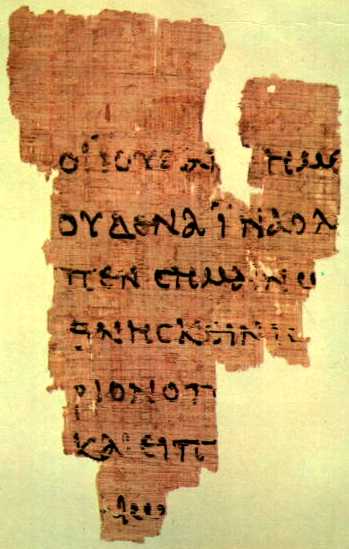drifting and gospel dating

P52
Currently suffering a touch of emotional and intellectual drift and sadness, which often happens.
Via Pharyngula, I've been listening to a talk by the atheist biblical scholar Hector Avalos. In it he showed a papyrus fragment of New Testament MS, the earliest dated fragment, called P52, which he mentions as dating from around 125CE. The purpose of showing this evidence was to underline the fact that we have nothing whatsoever from the time of Jesus to prove his actual existence. It interested me, though, in terms of addressing again the dates of the gospels. This fragment is from John, which I seem to recall is generally agreed to be the last-written gospel. In fact, according to this site, the fragment's dates are estimated as between 125 and 150CE. It has not been carbon dated, according to Avalos, it has only been dated through paleography [hand-writing]. However, though there are no other extant manuscripts dating before the third century, the gospels are dated according to the events recorded within them [eg the destruction of Jerusalem in 70CE, apparently prophesied in Mark, possibly because it had already happened], and according to their political treatment of the Romans and the Jews [there were obviously great tensions between them both before and after Jerusalem's destruction], as well as the use of Latinisms and other possible markers. Scholars are generally agreed that the writing of Mark, the earliest gospel, falls between 65 and 75CE.
Avalos is keen to cast doubt on the very existence of Jesus, which is very easy to do. He says in his talk that the name Jesus isn't mentioned in fragment P52 - though he doesn't deny that it's a genuine fragment of John. The above-mentioned site gives a translation [the MS is in Greek] which, through reconstruction of the missing words, mentions Jesus and Pilate a number of times [both sides of the papyrus are written on]. It was discovered in Egypt, which suggests, well, nothing much more than the gospel had spread to Egypt by that time.
Another, smaller and older fragment, 7Q5, from the Qumran caves, is purported to be from Mark, but the evidence is very doubtful.
I happen to have been reading a bit on anti-semitism lately - first, only sketchily, in Rebecca West's book, in which she merely points out William Joyce's anti-semitism, but more powerfully in Niall Ferguson's The War of the World, which looks at all the cultural, economic, imperial and other forces swirling around in the first half of the twentieth century. Amongst all that is European [and American] anti-semitism and its role in WW2. And I'm also reading Rome and Jerusalem: the clash of civilisations, by Martin Goodman, which focuses primarily on the destruction of Jerusalem by the Romans, its causes and consequences. The book has a brief epilogue entitled 'the origins of anti-semitism', which I read this morning [though I've only read a fraction of the book itself].
So there's always material to write about, to keep depression at bay.
Labels: just stuff, the faith hope


0 Comments:
Post a Comment
Subscribe to Post Comments [Atom]
<< Home